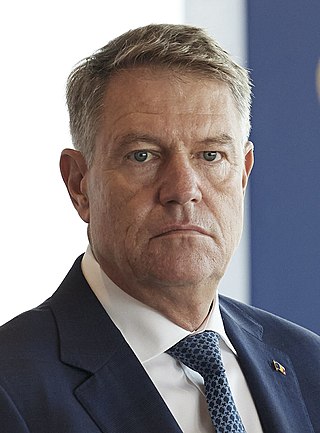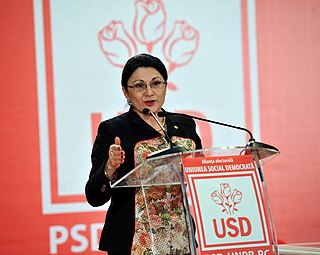Related Research Articles
Romania does not allow same-sex marriage or civil unions. Registered partnerships have been debated in the Parliament of Romania several times since 2008, though no bill on the matter has successfully passed. In May 2023, the European Court of Human Rights ruled that Romania was violating the European Convention on Human Rights by not recognizing same-sex unions. The government appealed the decision to the Grand Chamber in August 2023, but this appeal was rejected on 25 September 2023. Romania is now legally obliged to provide legal recognition to same-sex couples, and may risk financial sanctions from the Council of Europe if it fails to change the law.

Klaus Werner Iohannis is a Romanian politician, physicist, and former physics teacher who has been serving as the fifth president of Romania from 2014.
The Romanian Revolution in 1989, which ended the Communist regime of Nicolae Ceauşescu in December 1989, offered the 15 religious denominations then recognized in Romania the chance to regain the terrain lost after 1945, the year when Dr. Petru Groza of the Ploughmen's Front, a party closely associated with the Communists, became prime minister. From that time, the Romanian Communist Party started a campaign of secularization, seeking to transform the country into an atheist state along Marxist-Leninist lines.
The National Council for Combating Discrimination is an agency of the Romanian government, established in 2001 and responsible for applying Romanian and European Union anti-discrimination laws and managing the National Anti-Discrimination Plan. The legal status of the CNCD was established by the anti-discrimination law of 2000 and subsequently amended in 2006. According to the law, the Council reports to the parliament and is politically independent. It has often ruled against government institutions at various levels.
CNCD Decision 323/2006 is a decision of Romania's National Council for Combating Discrimination (CNCD) regarding the display of religious symbols in public schools. The decision was brought to the CNCD by Emil Moise, a teacher and parent from Buzău County, who stated that the public display of Orthodox icons in classrooms constitutes an infringement of Romania's separation of church and state and discriminates against atheist, agnostic and non-religious people.

Remus Cernea is a Romanian activist against discrimination based on faith and religion, an advocate of the separation of church and state and the founder of the Solidarity for Freedom of Conscience Association. From 2012 to 2016, he served as a member of the Chamber of Deputies. He was also president of the Green Party (PV).

Victor Viorel Ponta is a Romanian politician and jurist who served as Prime Minister of Romania from 2012 to 2015. He was president of the Social Democratic Party (PSD) from 2010 to 2015, and joint leader (2012–2014) of the then-governing Social Liberal Union (USL), an alliance with the National Liberal Party (PNL). Ponta was a member of the Romanian Chamber of Deputies for Gorj County from 2004 to 2020, and was returned to a Dâmbovița County seat in 2024.

Ecaterina Andronescu is a Romanian engineer, professor, and politician. A member of the Social Democratic Party (PSD), she sat in the Romanian Chamber of Deputies from 1996 to 2008, representing Bucharest, and was a Senator from 2008 until 2020, for the same city. In the Adrian Năstase cabinet, she was Education Minister from 2000 until June 2003. She held the same position in the cabinet of Emil Boc from 2008 to 2009, in the Victor Ponta cabinet during 2012, and finally in the Viorica Dăncilă cabinet for under 9 months between November 2018 and August 2019. She is married and has one child.

Dacian Julien Cioloș is a Romanian agronomist who served as Prime Minister of Romania from November 2015 to January 2017. He previously served as Agriculture Minister under Călin Popescu-Tăriceanu between October 2007 and December 2008. In November 2009, European Commission President José Manuel Barroso nominated him to be the next Agriculture Commissioner, a position he assumed in February 2010 and held until his term expired in November 2014. In November 2015, President Klaus Iohannis named him prime minister; Cioloș assumed office after receiving approval from Parliament.

Presidential elections were held in Romania in 2014. They were the seventh presidential elections held in post-1989 Romania. In the first round of the elections on 2 November, the top two of the fourteen candidates qualified in a run-off on 16 November. These candidates were Victor Ponta, former Prime Minister and ex-leader of the Social Democratic Party (PSD) who won around 40% of the vote in the first round, and Klaus Iohannis, then mayor of Sibiu and leader of the Christian Liberal Alliance (ACL), who won around 30% in the first round respectively. Following large protests on how Ponta's government organized the elections in the diaspora, Klaus Iohannis staged a surprising come-back and won the run-off with 54.5%, or more than a million votes than his contender.

The Roșia Montană Protests were a series of protests in 2013 in Bucharest, Cluj-Napoca, Iași and dozens of other cities in Romania and abroad against the Roșia Montană mining project. Protesters said that the mining project would destroy the environment and heritage of Roșia Montană and demanded the withdrawal of a law which would enable this project to commence. In Bucharest, protests were held every evening in the University Square and marches were held each Sunday.
In Bucharest – the capital city of Romania – the problem of stray dogs has been acknowledged for decades. The number of stray dogs has been reduced drastically since 2014, following the death of a four-year-old child who was attacked by a dog. In 2015, the Bucharest City Hall stated that over 51,200 stray dogs were captured between October 2013 and January 2015, with more than half being euthanized, about 23,000 being adopted, and 2,000 still residing in the municipality's shelters. The issue has not only been a heated subject of debate in Bucharest, but also on a nationwide scale.
Ponta II Cabinet was the Council of Ministers which governed Romania from 21 December 2012 to 5 March 2014. A crisis inside the ruling coalition, the Social Liberal Union (USL), resulted in the split of the governing alliance and collapse of the government.

The 2012–2015 unrest in Romania refers to a prolonged period of civil unrest and political scandals in Romania, which took magnitude after the second half of the 2000s. The wave of civil demonstrations started in January 2012, once with the introduction of a new health reform legislation. The protests were fueled by the austerity measures applied in May 2010, but also by the unpopularity of Băsescu-backed Boc government. The demonstrations were characterized by widespread rioting and acts of vandalism. The political situation precipitated, so Prime Minister Emil Boc decided to step down on 6 February 2012.
Valer Dorneanu is a Romanian politician and jurist. A prominent member of the Social Democratic Party (PSD), Dorneanu was the president of the Chamber of Deputies between December 2000 and November 2004. He spent four additional years in the Chamber, departing at the 2008 election. From 18 October 2010 to 28 March 2013, he was adjoint to the Romanian Ombudsman office, in the military, juridical, police, and penitentiary areas. From 3 July 2012 to 23 January 2013, he functioned interimistically as the Ombudsman. From 2013 to 2022 he was a judge in Romania's Constitutional Court, for a mandate of 9 years, and the president of this institution from 2016 until the end of his mandate.
The Fourth Ponta Cabinet was the government of Romania from 17 December 2014 to 17 November 2015. The Cabinet was supported by the Social Democratic Party (PSD), the National Union for the Progress of Romania (UNPR) and the Alliance of Liberals and Democrats (ALDE), the alliance forged by Călin Popescu-Tăriceanu's Liberal Reformist Party (PLR) and Daniel Constantin's Conservative Party (PC). Fourteen of the ministerial portfolios were held by PSD members, three by ALDE, two by UNPR and two by independent members.
During the first days of June 2015, the Government of Romania was rocked by criminal investigation against Prime Minister Victor Ponta for 19 acts of corruption between 2007 and 2008, when he was lawyer. Moreover, Victor Ponta is also investigated for conflict of interest during his premiership, when he propelled Dan Șova, political ally and friend, in government positions. His resignation was demanded by President Klaus Iohannis and several figures in opposition. Victor Ponta denied the allegations and refused to resign, plunging the country into the second political crisis in just three years.

Sorin Mihai Cîmpeanu is a Romanian politician who served as Minister of Education in Ciucă Cabinet. He had previously held the same position in Ponta IV and Cîțu cabinets, and, between 5 and 17 November 2015, acted as Prime Minister of Romania, after President Klaus Iohannis accepted Prime Minister Ponta's resignation. Klaus Iohannis's appointment of Sorin Cîmpeanu was just a stopgap measure until a new candidate for the post was selected.
Events from the year 2022 in Romania.
Beginning at 04:05 EEST on 29 April 2022, a series of multiple denial-of-service attack (DDoS) attacks were launched against several Romanian government, military, bank and mass media websites. Behind the attacks was the pro-Kremlin hacking group Killnet, who resorted to this in response to a declaration made by Florin Cîțu, the then-president of the senate of Romania, that Romania would provide Ukraine with military aid. The Russian Federation, who invaded the latter, publicly spoke against Western military support for Ukraine, stating that it would result in "lightning-fast retaliatory strikes". The DDoS attacks continued until 1 May.
References
- ↑ Raluca Pantazi, Inscrierea din oficiu a elevilor la ora de religie incalca dreptul la libertatea constiintei - Csaba Asztalos, presedintele Consiliului National pentru Combaterea Discriminarii, HotNews, February 21, 2013, Retrieved December 2, 2013
- ↑ Raluca Pantazi, Interzicearea casatoriilor gay in viitoarea Constitutie. Csaba Asztalos: Canalizam ura societatii prin acte ca legea fundamentala doar pentru a avea cvorum la Constitutie/ Florin Buhuceanu: Biserica Ortodoxa Romana este una autista, nu cred ca dialogheaza cu cineva, HotNews, June 7, 2013, Retrieved December 2, 2013
- ↑ Alina Brebenel, VIDEO Președintele Consiliului pentru Combaterea Discriminării: Există riscul ca CNCD să se politizeze, Adevărul, June 19, 2013, Retrieved December 2, 2013.
- ↑ Raluca Pantazi, Csaba Asztalos, presedintele Consiliului pentru Combaterea Discriminarii: Am spus de nenumarate ori in interior ca exista riscul ca CNCD sa se politizeze. Am datoria sa fac publica situatia, Hotnews , June 19, 2013, Retrieved December 2, 2013
- ↑ Raluca Pantazi, Csaba Asztalos, presedintele Consiliului pentru Combaterea Discriminarii: Imi este rusine de hotararea CNCD in cazul deputatului Alexandru Baisanu Archived 2013-10-14 at the Wayback Machine , HotNews, October 11, 2013, Retrieved December 2, 2013
- ↑ Andrei Călin, October 12, 2012, Președintele CNCD a fost agresat în plină stradă, Evenimentul Zilei, Retrieved December 2, 2013
- ↑ Bogdan Vladu, October 12, 2012, Asztalos agresat pe stradă! » Președintele CNCD a fost atacat de patru indivizi în centrul Capitalei, Gazeta Sporturilor, Retrieved December 2, 2013
- ↑ Sabina Fati, October 15, 2013, Interviu cu Csaba Asztalos, președintele Consiliului Național pentru Combaterea Discriminării - Președintele CNCD: Am primit AMENINȚĂRI la adresa persoanei și a familiei mele Archived 2013-12-03 at the Wayback Machine , România Liberă, Retrieved December 2, 2013
- ↑ Andrei Dumitrescu, October 13, 2012, Un grup de ONG-uri i-a semnalat lui Ponta că președintele CNCD a fost atacat stradal. Csaba Asztalos: Am depus plângere, Mediafax, Retrieved December 2, 2013
- ↑ October 16, 2012, UDMR: Ceea ce i s-a întâmplat lui Asztalos Csaba este de neîngăduit și inacceptabil Archived 2013-12-03 at the Wayback Machine , România Liberă, Retrieved December 2, 2013
- ↑ Corina Ionel, October 14, 2012, Premierul Ponta cere autoritatilor abilitate sa investigheze atacul impotriva sefului CNCD si sa pedepseasca vinovatii, HotNews, Retrieved December 2, 2013